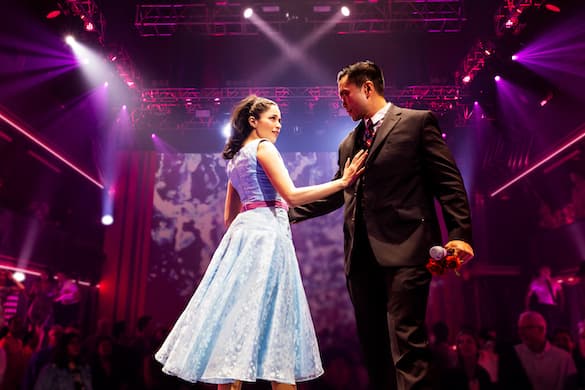From David Byrne, a Chance To Immerse Yourself in Imelda Marcos’s Long Saga
The Broadway Theatre has been transformed into a glittering playground for ‘Here Lies Love,’ with the orchestra section now occupied by platforms where much of the action unfolds within reach of standing observers.

A young girl from a humble background finds national and then worldwide celebrity after marrying a politician whose leadership will not be remembered fondly by history. This has been the premise for two Broadway musicals: The first, Andrew Lloyd Webber and Tim Rice’s “Evita,” which opened at New York in 1979 after proving a hit at London, traced the short but busy life of Eva, the glamorous wife of an Argentinian strongman, Juan Perón.
Now, “Here Lies Love” arrives a decade after having its celebrated premiere at the Public Theater. Conceived by rock visionary David Byrne — whose concert-based “American Utopia” was one of the most exuberant productions to land in the theater district in years — and featuring music by Mr. Byrne and electronic savant Fatboy Slim, “Love” traces the rise and fall of Imelda Marcos, widow of a Filipino dictator, Ferdinand Marcos. Empowered by support from the American government, Marcos’s reign of terror included nearly a decade of martial law starting in 1972, and he remained an oppressive force until deposed by 1986’s People Power Revolution.
While Eva Perón was struck down by cancer in her early 30s, Ms. Marcos actually returned to the Philippines after her husband’s death to serve in the government. Now 94, she is mother to the current president, Bongbong Marcos, who some say appears to have inherited his father’s corrupt inclinations; the current production of “Love” eventually nods to that development.
If you were lucky enough to catch “Love” at the Public, you know this trajectory didn’t stop Messrs. Byrne and Slim and director Alex Timbers, also a collaborator on “Utopia,” from sustaining a mood of infectious exuberance. In its original venue, the theater space became a vast dance floor where audience members could stand in close proximity and even interact with cast members, as the show’s exhilarating, disco-inspired score reminded them of Ms. Marcos’s noted fondness for nightspots such as Studio 54.

Uptown, the party has only gotten bigger: Mr. Timbers and scenic designer David Korins have, with ample support from Justin Townsend’s neon-infused lighting and Peter Nigrini’s dazzling projection design, transformed the Broadway Theatre into a glittering playground. The orchestra section is now occupied by platforms where much of the action unfolds within reach of standing observers. The mezzanine, too, offers an immersive experience, with a turbo-charged deejay played by Moses Villarama and dancers urging fans to shake their bodies, and principal actors occasionally climbing up to, in character, appeal to their souls.
The result is that you may well feel more personally involved in the historical proceedings than you did if you attended, say, “Hamilton,” or even earlier efforts by Mr. Timbers such as the stirring “Bloody Bloody Andrew Jackson” or “Joan of Arc: Into the Fire,” for which Mr. Byrne wrote the book, music, and lyrics. (Mr. Byrne is the sole lyricist for “Love” as well; Tom Gandey and José Luis Pardo are credited with additional music.)
The performers, all of them of Filipino extraction, are central to this effect, of course, from the ensemble members who give life to Annie-B Parsons’s vibrant choreography (and teach it to audience members on one occasion) to leads Arielle Jacobs, Jose Llana, and Conrad Ricamora, who respectively play Imelda, Ferdinand, and Ferdinand’s noble nemesis, Ninoy Aquino, the senator and opposition leader who became a political prisoner and was eventually assassinated.
Messrs. Llana and Ricamora deliver robust, nimble performances that suggest both the political skills their characters share and the fundamental differences between them, as Mr. Llana’s purposeful slickness contrasts sharply with Mr. Ricamora’s nervy vigor. Ms. Jacobs, who sings beautifully, lends an imperious edge to Imelda while showing the First Lady’s own frustrations and vulnerability. (Wisely, the show’s creators do not touch on Ms. Marcos’s storied shoe fixation.)
Broadway veteran Lea Salonga, a co-producer of the show, is also in the company through August 13, playing Aquino’s mother. “I got to call the people, Mom/And get ’em all together,” she sings in “Just Ask the Flowers,” using quotes uttered as the real Aurora Aquino paid homage to her son at his funeral. “Here Lies Love” revels in that sense of communion, at once urging us to study history’s more painful lessons and encouraging us to dance in the dark.

